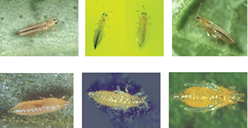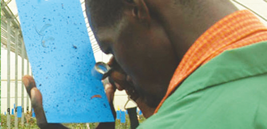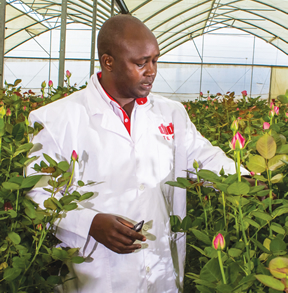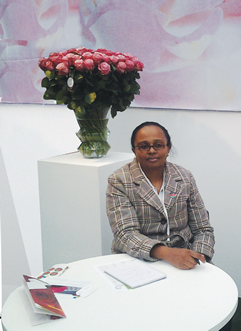 Thrips, order Thysanoptera, are tiny, slender insects with fringed wings. They feed by puncturing the epidermal (outer) layer of host tissue and sucking out the cell contents, which results in stippling, discolored flecking, or silvering of the leaf surface. Thrips feeding is usually accompanied by black varnishlike flecks of frass (excrement).
Thrips, order Thysanoptera, are tiny, slender insects with fringed wings. They feed by puncturing the epidermal (outer) layer of host tissue and sucking out the cell contents, which results in stippling, discolored flecking, or silvering of the leaf surface. Thrips feeding is usually accompanied by black varnishlike flecks of frass (excrement).
Pest species are plant feeders that discolor and scar leaf, flower, and fruit surfaces, and distort plant parts or vector plant pathogens. Many species of thrips feed on fungal spores and pollen and are often innocuous. However, pollen feeding on plants such as orchids and African violets can leave unsightly pollen deposits and may reduce flower longevity. Certain thrips are beneficial predators that feed on other insects and mites.

 The crop protection industry is dominated by the large multinational agro-chemical companies such as Syngenta, Monsanto and Bayer Cropscience. The biocontrol business is minute in comparison, with only 3% of global sales of crop protection products. The future of the biocontrol industry is based on a range of interacting factors and difficult to predict the future, however many are suggesting that its future is likely to grow. There are numerous drivers for the use of biological control.
The crop protection industry is dominated by the large multinational agro-chemical companies such as Syngenta, Monsanto and Bayer Cropscience. The biocontrol business is minute in comparison, with only 3% of global sales of crop protection products. The future of the biocontrol industry is based on a range of interacting factors and difficult to predict the future, however many are suggesting that its future is likely to grow. There are numerous drivers for the use of biological control. Briefly discuss Barnaba Rotich (Background-Personal and a professional)
Briefly discuss Barnaba Rotich (Background-Personal and a professional) Briefly discuss Irene Njeru (background-personal and as a grower)
Briefly discuss Irene Njeru (background-personal and as a grower)